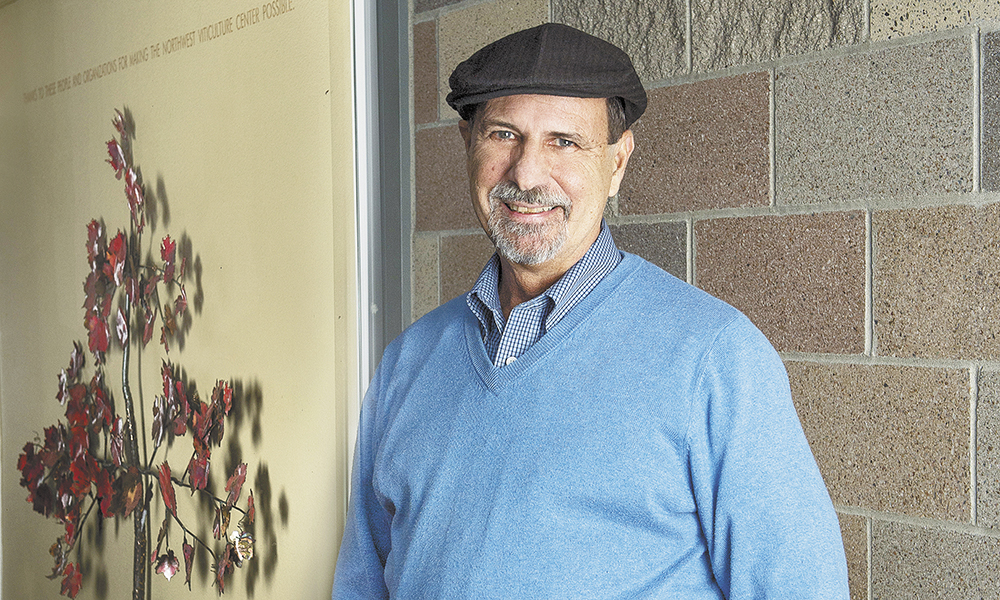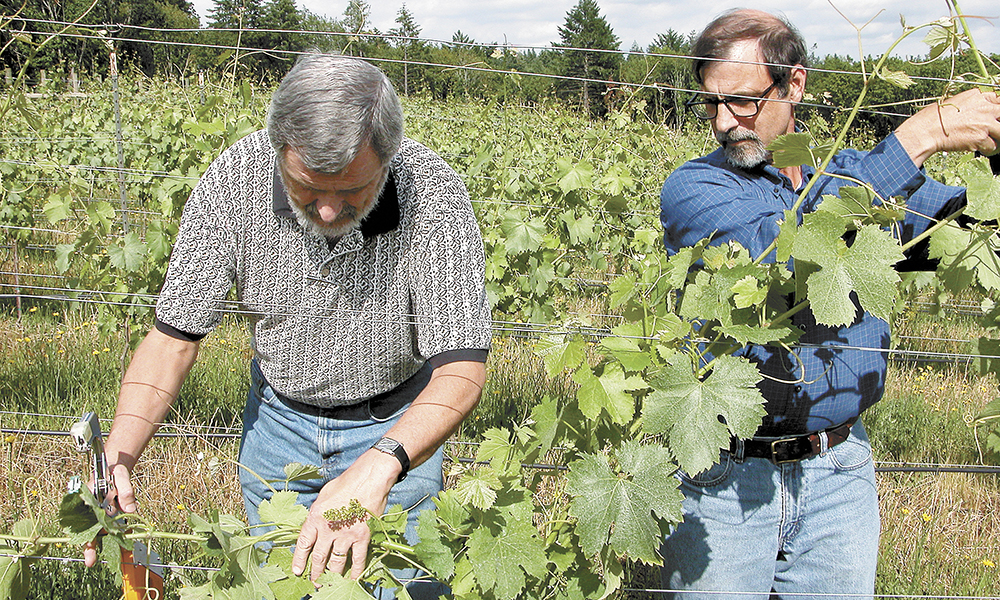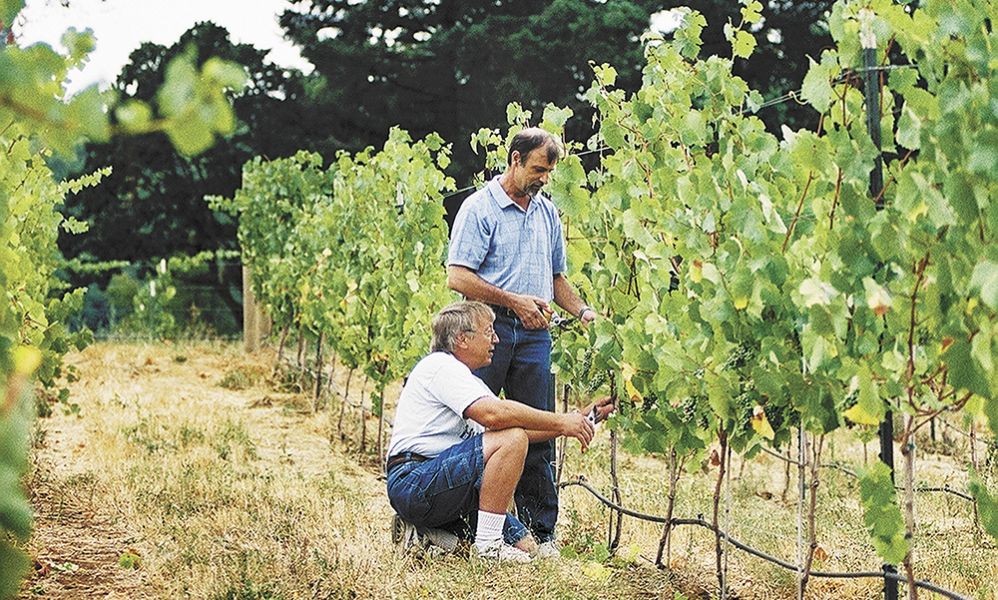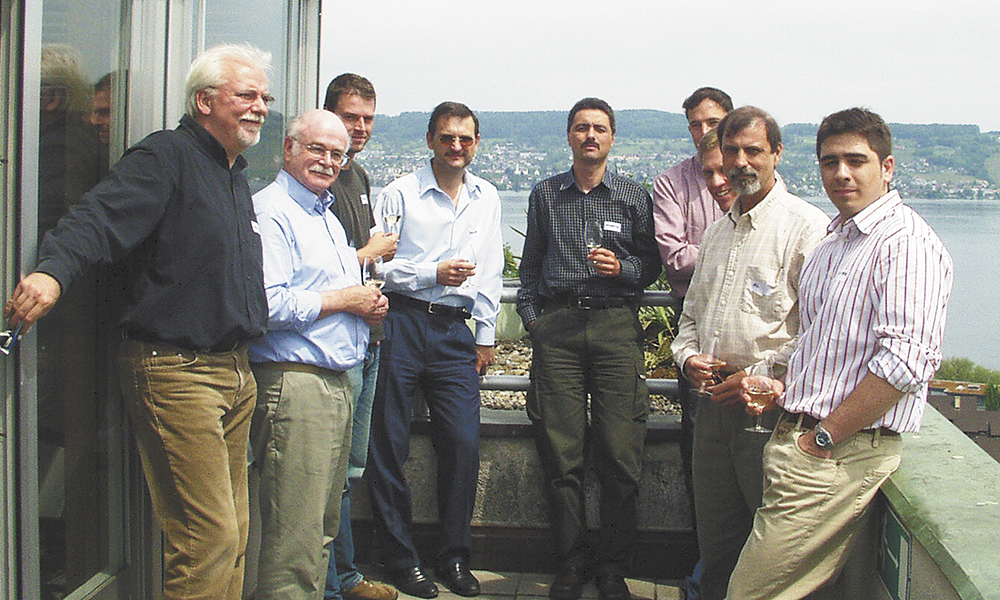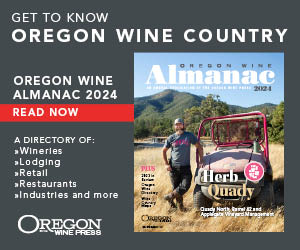OWP Wine Person of 2014: Al MacDonald
For more than three decades, Al MacDonald has pioneered Oregon grape growing and viticulture education.
Among the handful of people pivotal in the evolution of Oregon wine, one should be given considerably more credit than he has thus far been accorded by industry chroniclers.
That person is Al MacDonald, who planted his first grapevines in 1982 and later served the Oregon wine industry with dedication and distinction for the next three decades.
Over the course of a 32-year career, he assumed pioneering leadership roles, became an acclaimed winegrower and taught viticulture to more than 2,000 students at the Chemeketa Community College’s Northwest Wine Studies Center
Commenting on the sheer numbers of his students who have figured prominently in winegrowing and winemaking, he said, “It’s a plethora of riches. There are so many, I can’t begin to name them all.”
When MacDonald arrived in Oregon in 1977, you could count the number of wineries in the state on one and one half hands. It was the year Bethel Heights was founded and the vintage in which the Sokol Blossers made their first wine.
He met his former wife, Joni Weatherspoon, who died in 2003, in Michigan; they moved to her hometown of Florence on the Oregon coast, where he put his master’s degree in psychology to good use running a family shelter. Assisting people in need for the next five years, he finally persuaded his wife to abandon the beach for inland life. To support themselves, they decided to try farming. The question was what to grow?
“The wine industry was really starting to get underway,” MacDonald said. “We both liked wine, and we were early enough to be able to buy a great piece of property. You might say we got in on the ground floor.”
That property was 250 acres of prime grapegrowing land on the eastern ridge of the Eola Hills, located about five miles north of Bethel Heights, one of the first two wineries, along with Hidden Springs, to recognize the area’s potential.
The MacDonalds bought the land in 1981 and planted their first 32 acres of Seven Springs Vineyard in 1982 — 16 acres each to Pinot Noir and Chardonnay. In 1981, the entire industry could count 1,237 acres of vines. Just a year later, that number rose to 1,812.
Seven Springs ultimately emerged as one of Oregon’s most widely acclaimed vineyards. Here is how Robert Parker’s The Wine Advocate described it: “There is no vineyard in the Willamette Valley more highly valued by winemakers than Seven Springs. Other vineyards may ripen their fruit earlier, but the few extra days of hang time at Seven Springs rewards you with great acid balance and focused red and black fruit.”
A Legacy of Learning
What others say about Al MacDonald
“Working with [Al] was always professional, productive and fun, and I especially appreciate all the help and support [he] gave me along the way at Chemeketa. [He] truly has always been the ‘backbone’ of the program from the beginning.”
- Barney Watson, Faculty Emeritus, Chemeketa
“Al MacDonald has been an exceptional and steadfast partner to Oregon’s wine grapegrowers and winemakers, helping them master the art and craft of farming at the margin. Al’s leadership and insights over the years have helped position Oregon as one of the world’s most promising viticultural regions but one that is unique for already consistently delivering on that promise.”
- Tom Danowski, Executive Director, OWB & OWA
“There are very few old timers who have made a larger contribution to the common cause efforts of our winegrower family than Al MacDonald. In the 1990s, he led our research effort and later chaired the OWAB. In 1997 he was part of a small group of growers that founded the LIVE program. He then led the LIVE Board for several years and served on it for many more, providing invaluable institutional memory.”
- Ted Casteel, Co-owner, Bethel Heights Vineyard
“Thanks to Al’s continual optimism, we never lost the faith that we were building something enduring.”
- Patrick McElligott, Wine Studies Instructor, Chemeketa
The highest praise that I have seen used for someone is something like the following: “He is the lawyer’s lawyer” or “He is the doctor’s doctor.” The easy parallel here is to say that Al MacDonald is the vineyardist’s vineyardist.”
- David Beck, Owner, Crawford Beck Vineyard
“When I enrolled in the new Viticulture/Enology program at Chemeketa in 1999, Al was the first person I met. After exploring the program and getting my questions answered, he asked me why I was interested in viticulture. I said that I had been sitting behind a desk for the last 18 years and wanted to be outside and that a vineyard seemed like a good place to be. His response was that he had been in a vineyard for the past 18 years and was looking forward to sitting behind a desk.”
- Rob Clarke, Owner, Terrapin Cellars
“There are so many things to thank Al for…his vision of and commitment to wine education in Oregon, his realistic approach to wine growing and teaching, and his help in getting me (through a snow storm!) to my first interview at Chemeketa. I’m so glad we made it!"
- Jessica Sandrock, Wine Studies Instructor, Chemeketa
Within a couple years, MacDonald became an active member of the then North Willamette Valley Growers, eventually serving as the group’s president. During this pivotal time of the industry’s emergence, he was selected to serve on the board of the Oregon Wine Growers Association and became its president. In that position, he helped reorganize the OWA to focus on legislative efforts and lobbying.
Over the years, Seven Springs fruit was vinified by some of the area’s top winemakers: St. Innocent and Bethel Heights led the list, along with Adelsheim, Domaine Drouhin Oregon, Cristom, Patricia Green, Dobbes Family Estate, Torii Mor and Evesham Wood. Most of them honored the wine’s origin by putting the vineyard name on the label.
In 1998, Seven Springs continued earning prestige when it won the Growers Award for grapes sourced for Best Red at the Oregon State Fair Wine Competition. The variety was Gamay Noir, which outscored all Pinot Noirs submitted.
Highlights for MacDonald from the time included his appointment by Governor Barbara Roberts to the Oregon Wine Advisory Board in 1994. He was research committee chair, then chairman during eight years of service to the board.
The Northwest Center for Small Fruits Research benefited from his participation as a grower industry member for more than a decade through the 1990s and into the early 2000s.
Of his many industry accomplishments, the one that outshines the rest — according to MacDonald — is his foundational work with LIVE (Low Input Viticulture and Enology, Inc.). From 1997 through 1999, he worked on the organizing committee for the sustainable vineyard program first proposed by Ted Casteel of Bethel Heights Vineyard.
That effort culminated in the creation of LIVE, a 501(c)3 charitable, nonprofit corporation offering sustainable viticulture certification to Oregon wineries. MacDonald was elected as LIVE’s first president in 1999 and continued with the organization through 2013.
LIVE was the first entity of its kind in the U.S. and has earned the endorsement of the IOBC (International Organisation for Biological Control). Under the guidance of IOBC, he wrote LIVE’s initial guidelines and checklist. This model is used by other states in launching their own programs.
From a career standpoint, the year 1999 is further punctuated by MacDonald’s appointment as the first-ever college-credit viticulture instructor at Chemeketa Community College.
He developed the curriculum, designed class plans and planted the eight-acre test vineyard adjacent to the then Northwest Viticulture and Enology Center at the southernmost point in the Eola-Amity Hills AVA. The test vineyard, on aggregate soil formed by erosion of the sloping hillside above, was first planted in 2001. That initial acre and a half was joined over time by a dozen different varieties, including several clones of Pinot Noir, Pinot Gris, Pinot Blanc, Riesling, Viognier, Gamay Noir, Chardonnay, Sauvignon Blanc, Syrah and Tempranillo.
“All of them don’t fully ripen every year,” MacDonald said. “But they give students the opportunity to study their appearance and growing habits.”
Before the test vineyard reached suitable teaching status, he taught classes at his own Seven Springs Vineyard, where participants practiced the real world application of first-hand viticultural skills.
In 2005, Seven Springs reached its apex of recognition when it was named one of the top ten vineyards in the U.S. by Food & Wine magazine.
After his divorce from Witherspoon in 2001 and the subsequent division of Seven Springs holdings, the vineyard was leased in 2007 for 15 years to Mark Tarlov, then co-owner of Evening Land Vineyards. Though Tarlov has moved on to found Chapter 24 Vineyards, Seven Springs remains under exclusive control by Evening Land.
Culminating his career, MacDonald has been a featured speaker on Oregon viticulture around the country and internationally, too. He also authored a chapter in the 1992 edition of the Oregon Winegrape Growers Guide and co-wrote two chapters in the 2003 edition — the Northwest Wine Studies Center uses both in its viticulture textbooks.
Commenting on his years in the role of viticulture instructor, he said. “It has been as fulfilling for me as much as it has for my students. I consider it to have an ongoing learning experience.”
Though modest in mentioning his accomplishments, MacDonald can truly be called one of the guiding forces behind the growth of the Oregon wine industry.
He helped nurture and encourage it from a fledgling hopeful clutch of cash-strapped entrepreneurs to a burgeoning business and an important contributor to the state’s economy.
A parallel description can be applied to the school where he taught for 23 years and retired from in December 2014. What started out life as Chemeketa Community College’s Northwest Viticulture Center has evolved into the Northwest Wine Studies Center, now often referred to by those in the know as Chemeketa Eola.
The Oregon-grown educational institution has reached the point where it deserves to be mentioned in the same breath with UC Davis, Germany’s Geisenheim and the Ecole du Vin in Bordeaux.
Much of that elevated status was earned through the contributions of Al MacDonald, the 2014 Oregon Wine Press Person of the Year.

